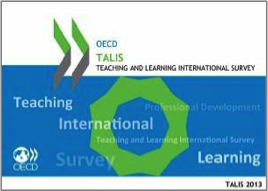
by Bob Rothman
 A new analysis of the Teaching and Learning International Survey (TALIS) has found that the quality of school leadership is related to the development of professional learning communities in schools. Schools in which principals focus on curriculum and instruction and in which they involve others in decision making are more likely to be places where teachers collaborate to improve their practice, the survey found.
A new analysis of the Teaching and Learning International Survey (TALIS) has found that the quality of school leadership is related to the development of professional learning communities in schools. Schools in which principals focus on curriculum and instruction and in which they involve others in decision making are more likely to be places where teachers collaborate to improve their practice, the survey found.
TALIS is a survey of teachers and principals in lower secondary schools in 38 countries and economies conducted by the Organisation for Economic Co-operation and Development (OECD). It was administered in 2013. The United States participated, but its sample size was too low to yield valid inferences on many questions. A report of the new analysis was released on September 20.
The survey identified four types of school leaders: administrative leaders, who spend a large portion of their time on school management; educational leaders, who are engaged in instructional leadership but do not do much to engage stakeholders in decisions; inclusive leaders, who do engage staff, parents, and students in decisions but spend less time on curriculum and instruction; and integrated leaders, who combine the qualities of educational leaders and inclusive leaders. These inclusive leaders, the survey found, are most likely to foster professional learning communities. Teachers in these schools engage in reflective dialogue and collaboration and have a shared sense of purpose and a focus on student learning.
In most countries and economies, most principals engage in educational leadership activities, such as ensuring that teachers take responsibility for improving their teaching skills, the survey found. However, a third of principals said they rarely engage in such activities. Principals who had received training in instructional leadership were more likely to engage in educational leadership activities, the survey found.
There were variations among countries in the degree to which principals engaged in educational leadership activities, and there was no clear relationship between educational leadership and student performance. The countries in which the vast majority of principals engaged in such activities included both high performers—such as Shanghai and Singapore—and low performers, such as Malaysia and Chile. In some high-performing nations, such as Finland, the majority of principals identified themselves as administrative leaders.
Montserrat Gomendio, deputy director for education and skills at OECD, said at a forum to release the report that school leadership affects student performance indirectly, and it is dependent on both teacher quality and student characteristics.
 There were variations among countries in distributed leadership as well. Nearly all principals in all countries said they provided staff with opportunities to participate in school decisions, and the vast majority in most nations involved parents and guardians in decisions as well. But only half the principals in Japan involved parents and guardians in decisions, and fewer than half of the principals in Japan and Italy involved students in decisions.
There were variations among countries in distributed leadership as well. Nearly all principals in all countries said they provided staff with opportunities to participate in school decisions, and the vast majority in most nations involved parents and guardians in decisions as well. But only half the principals in Japan involved parents and guardians in decisions, and fewer than half of the principals in Japan and Italy involved students in decisions.
The survey also examined school climate, such as the disciplinary climate and student-teacher relationships. However, it found that the relationship between school leadership and climate is weak; climate is more strongly affected by teachers’ experience and the student population. Teachers of students from disadvantaged backgrounds and those with special needs might benefit from reflecting on their practice in collaboration with other teachers, the report suggested.
The report also proposed that training programs for principals emphasize the importance of integrated leadership, and that professional development programs for school leaders provide them with skills to engage in educational leadership activities. It also proposed professional development for teachers to ensure that all teachers can participate in professional learning communities effectively.
The next TALIS survey is scheduled to take place in 2018.
The report, School Leadership for Learning: Insights from TALIS 2013, is available on the OECD’s website.




